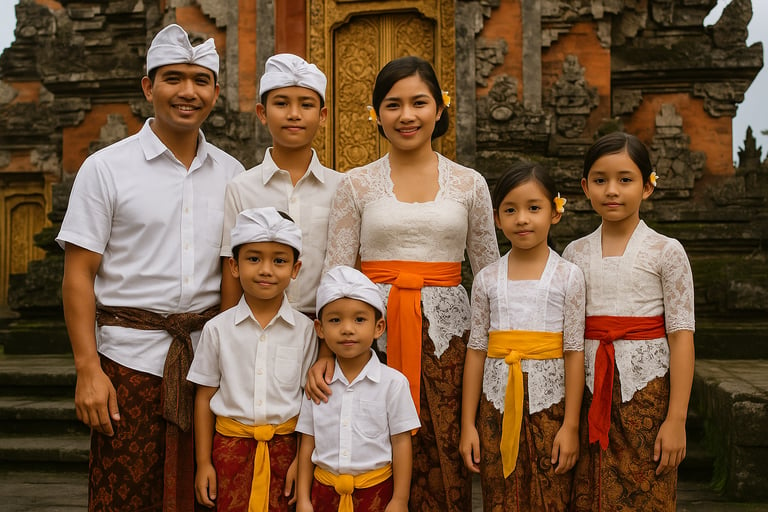Balinese Name
One of the first things you may notice in Bali is how many people share the same names. Don’t be surprised if your driver, your waiter, and your tour guide are all called Wayan or Made. This is because Bali has a unique and traditional naming system that reflects both culture and order of birth.
In Balinese tradition, names are usually given according to birth order, not family names. The firstborn is often called Wayan, Gede or Putu, the second child Made or Kadek, the third Nyoman or Komang, and the fourth Ketut. If a family has more than four children, the cycle starts again, so the fifth child may also be called Wayan, and so on.
Beyond birth order, there are names that indicate noble lineage or higher status, such as Gusti, Anak Agung, Ida Bagus, Cokorda, and Dewa. Noble or clan names you may also encounter include Desak, Ngakan, Kompyang, Sang, Si, and Pande, each tied to heritage and social tradition.
A special case is Jero (or Jro), which is not a birth name but a religious or ceremonial title granted when someone takes temple or priestly responsibilities. The full priestly title is Jero Mangku, and when addressing them politely you may say Pak Mangku or Ibu Mangku, or interchangeably Pak Jero or Ibu Jero.
For high priests you may also see the title Ida, used with great respect for senior spiritual figures. In formal or written contexts you may also see “I” for men and “Ni” for women, but these are not used as everyday call names.
This naming system can feel confusing for visitors because you may meet many people with the same name, but it is important to remember that in Bali these names carry cultural and spiritual meaning. Among friends, nicknames, shortened versions, or middle names are often used to make it easier to distinguish between individuals.
When speaking directly to Balinese people, it is polite to use local salutations. Men are often addressed as Bli, while women are called Mbok—for example, “Bli Wayan” or “Mbok Wayan.” These are casual and friendly. For higher respect, use Pak for men and Ibu for women. For noble men, the respectful salutation can also be Ajik, while for noble women the form remains Ibu. For priests, the respectful forms are Pak Mangku or Ibu Mangku, and equally polite are Pak Jero or Ibu Jero. These distinctions show courtesy and respect, and locals will appreciate them greatly.
An interesting development in recent years is that the third and fourth names, Nyoman or Komang and Ketut, are becoming rarer. Because of economic considerations, many Balinese families now prefer to have only two children. As a result, the government has even started offering incentives to families who give their children these names, in order to preserve the tradition and keep the naming system alive.
Visitors should also know that it is not considered rude to ask someone’s first name or to talk about the naming system. In fact, Balinese people are usually delighted when foreigners take an interest. Don’t be shy—simply ask their first name and try to guess whether they are a first, second, third, or fourth child based on it. Far from being offended, they will often smile, laugh, and happily explain the meaning of their name, making it a warm and memorable conversation.
For travelers, understanding this tradition helps you appreciate Balinese culture more deeply and also avoids misunderstandings when addressing locals. It is not just about names—it is about family, heritage, and identity in everyday Balinese life. If you want to learn more about Balinese culture, choose Bali LLC as your holiday partner and experience the island with real insight.


PT Bali Mundi International
Badung, Bali, Indonesia
80361
+62 8 123 666 567
Bali Mundi International LLC
Dover, DE, United States
19901
+1 940 603 4322
Copyright © 2025 Bali LLC
